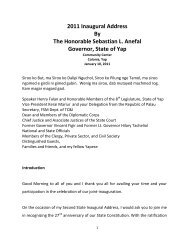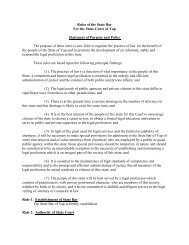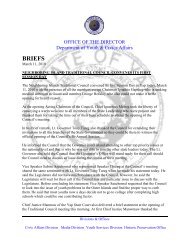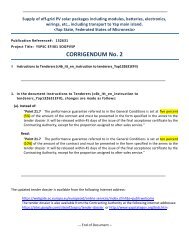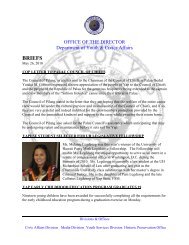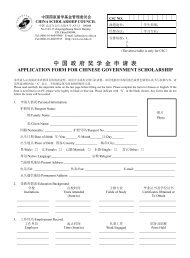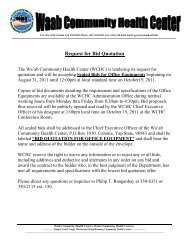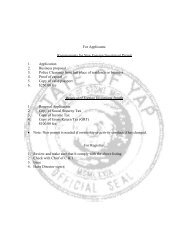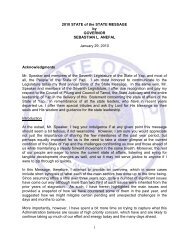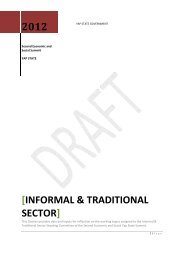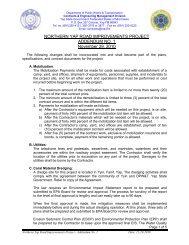RULES OF CIVIL PROCEDURE For the Trial Division of the Yap ...
RULES OF CIVIL PROCEDURE For the Trial Division of the Yap ...
RULES OF CIVIL PROCEDURE For the Trial Division of the Yap ...
You also want an ePaper? Increase the reach of your titles
YUMPU automatically turns print PDFs into web optimized ePapers that Google loves.
The person to whom <strong>the</strong> subpoena is directed may, within 10 days after <strong>the</strong> service<br />
<strong>the</strong>re<strong>of</strong> or on or before <strong>the</strong> time specified in <strong>the</strong> subpoena for compliance if such time is<br />
less than 20 days after service, serve upon <strong>the</strong> attorney or trial counselor designated in <strong>the</strong><br />
subpoena written objection to inspection or copying <strong>of</strong> any or all <strong>of</strong> <strong>the</strong> designated<br />
materials. If objection is made, <strong>the</strong> party serving <strong>the</strong> subpoena shall not be entitled to<br />
inspect and copy <strong>the</strong> materials except pursuant to an order <strong>of</strong> <strong>the</strong> court from which <strong>the</strong><br />
subpoena was issued. The party serving <strong>the</strong> subpoena may, if objection has been made,<br />
move upon notice to <strong>the</strong> deponent for an order at any time before or during <strong>the</strong> taking <strong>of</strong><br />
<strong>the</strong> deposition.<br />
(2) The court, upon motion made promptly, may quash or modify <strong>the</strong> subpoena if<br />
it is unreasonable or oppressive to <strong>the</strong> person it is directed to in regard to <strong>the</strong> place where<br />
<strong>the</strong> deposition is proposed to be taken.<br />
(e) Subpoena for a Hearing or <strong>Trial</strong>. A subpoena requiring <strong>the</strong> attendance <strong>of</strong> a<br />
witness at a hearing or trial may be served at any place within <strong>the</strong> State <strong>of</strong> <strong>Yap</strong>. The<br />
court, upon motion made promptly, may quash or modify <strong>the</strong> subpoena if it is<br />
unreasonable or oppressive to <strong>the</strong> person it is directed to in regard to <strong>the</strong> travel involved<br />
to <strong>the</strong> place <strong>of</strong> <strong>the</strong> hearing or trial.<br />
(f) Contempt. Failure by any person without adequate excuse to, obey a subpoena<br />
served upon him may be deemed a contempt <strong>of</strong> <strong>the</strong> court.<br />
Rule 46. Objecting to a Ruling or Order. A formal exception to a ruling or order is<br />
unnecessary. When <strong>the</strong> ruling or order is requested or made, a party need only state <strong>the</strong><br />
action that it wants <strong>the</strong> court to take or objects to, along with <strong>the</strong> grounds for <strong>the</strong> request<br />
or objection. Failing to object does not prejudice a party who had no opportunity to do so<br />
when <strong>the</strong> ruling or order was made.<br />
Comment: Rule 46 has been changed to ease comprehension and to reflect <strong>the</strong><br />
most recent version <strong>of</strong> <strong>the</strong> U.S. Federal Rules <strong>of</strong> Civil Procedure. No significant<br />
substantive changes are intended.<br />
Rules 47.-51. Vacant. (Dealing with Jury)<br />
Rule 52. Findings by <strong>the</strong> Court.<br />
(a) Effect. In all actions <strong>the</strong> court shall find <strong>the</strong> facts specially and state separately its<br />
conclusions <strong>of</strong> law on it, and judgment shall be entered pursuant to Rule 58; and in<br />
granting or refusing interlocutory injunctions <strong>the</strong> court shall similarly set forth <strong>the</strong><br />
findings <strong>of</strong> fact and conclusions <strong>of</strong> law which make up <strong>the</strong> grounds <strong>of</strong> its action. Requests<br />
for findings are not necessary for purposes <strong>of</strong> review. Findings <strong>of</strong> fact shall not be set<br />
aside unless clearly erroneous, and due regard shall be given to <strong>the</strong> opportunity <strong>of</strong> <strong>the</strong><br />
trial court to judge <strong>the</strong> credibility <strong>of</strong> <strong>the</strong> witnesses. The findings <strong>of</strong> a master, to <strong>the</strong> extent<br />
that <strong>the</strong> court adopts <strong>the</strong>m shall be considered as <strong>the</strong> findings <strong>of</strong> <strong>the</strong> court. If an opinion or<br />
memorandum <strong>of</strong> decision is filed, it will be sufficient if <strong>the</strong> findings <strong>of</strong> fact and<br />
conclusions <strong>of</strong> law appear <strong>the</strong>rein. Findings <strong>of</strong> fact and conclusions <strong>of</strong> law are<br />
unnecessary on decisions <strong>of</strong> motions under Rules 12 and 56 or any o<strong>the</strong>r motion except



